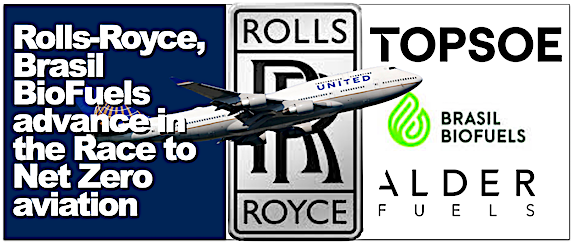Rolls-Royce, Alder Fuels, Brazil BioFuels, Topsoe advance in the Race to Net Zero aviation

The race is on. It was a race to lower carbon aviation. Now it is a race for Net Zero. Ultimately, as we have tipped, it will become a race for carbon negative aviation because only when a jet becomes a Hoover in the skies, reducing carbon with every flight, will airlines and travelers be able to get back to their usual business of flying more.
Meanwhile, Topsoe has been picked to support first sustainable aviation fuel-production in Brazil. Brasil BioFuels will build a new biorefinery to produce sustainable aviation fuel and second generation biofuel using Topsoe’s Hydroflex and H2bridge technologies. The new biorefinery will be built in Manaus, Brazil, and will have a production capacity of 500,000 tonnes per year The production is expected to start in 2025, using hydrotreated vegetable oil as a feedstock.
Topsoe’s hydroprocessing technology will allow the biorefinery to produce the low-carbon fuels while at the same time recycling gases and liquids from the process for production of hydrogen that will be integrated in the biorefinery’s operations.
HydroFlex and H2 Bridge technology backstories
With HydroFlex, customers can convert low value feedstocks into drop-in renewable jet and diesel that meets all of the globally accepted specifications for these fuels. The innovative HydroFlex process layout offers lower capital expenditure, but also a lower energy consumption during operation, resulting in a lower Carbon Index.
The H2 Bridge technology captures waste propane and carbon off gas from the refining process, converts it into hydrogen to be included in powering facility operations.
Rolls-Royce accelerates in partnership with Alder
Meanwhile in the UK, Rolls-Royce has signed a Memorandum of Understanding with Alder Fuels to further test Alder’s Sustainable Aviation Fuel as it makes the critical next step on its journey to commercial scalability.
The testing, which will include flight tests on a Rolls-Royce Pearl engine, will evaluate the energy efficiency, emissions criteria, and low-carbon credentials of the SAF produced from Alder Greencrude.
The engine tests will assess the performance of AGC-derived SAF compared to fossil-based jet fuel to further support its performance as a drop-in replacement for traditional jet fuel and generate critical data for the development of a 100% SAF specification by ASTM International. In addition, the SAF will undergo a full lifecycle and criteria emissions assessment, and the data associated with this assessment will be transparently reported to advance global decarbonization efforts.
Rolls-Royce has previously committed to ensuring all its Trent and Business Aviation engines are compatible with 100% SAF by 2023. All Trent and Business Aviation engines are already certified and ready to operate on a 50% SAF blend with traditional fossil-based aviation jet fuel.
The Alder technology backstory
Alder Fuels uses sustainable biomass such as regenerative grasses, forest residues and agricultural waste products to create low-carbon Alder Greencrude (AGC) that can be converted into a drop-in SAF using existing bio and petroleum refinery infrastructure. The process, which has been developed in close partnership with the US Department of Energy’s National Renewable Laboratory, can achieve greenhouse gas reductions of over 80 percent compared to fossil-based jet fuel.
Reaction from the stakeholders
Gustavo Cienfuegos, Managing Director at Topsoe, Latin America, said: “We are thrilled to be selected as technology provider by Brasil BioFuels for their ambitious plans of introducing SAF and second generation biofuels to the Brazilian market. We are excited to start working with Brasil BioFuels to deliver these clean fuels”.
Milton Steagall, CEO of Brasil BioFuels, added: “We are looking for the best and most innovative technologies so that our biorefinery, a pioneer in the country, will be a reference in sustainability and operational excellence.”
Frank Moesta, SVP Strategy & Future Programmes – Business Aviation, Rolls-Royce, said, “The use of Sustainable Aviation Fuel as a low-emission solution and its global commercial deployment are essential to the decarbonization of medium to long-haul air travel. While we are also working on electrification, hybrid-electric and hydrogen technologies as long-term alternatives, rapid decarbonization is within reach through this critical pathway. Through our partnership with Alder Fuels, we are taking the next steps on our journey to net zero and are committed supporters of the UN Race to Zero goal of 10% SAF use across aviation by 2030.”
Bryan Sherbacow, President and CEO of Alder Fuels commented, “At Alder, we are on a path to transform energy on the global stage and partnership is key to our vision. As a pioneer in both industrial technology and sustainable aviation, Rolls-Royce will play a leading role in decarbonizing the aerospace industry. Their name is synonymous with the best of engineering. Our hope is that this collaboration will not only mark an important milestone for the decarbonization of aviation, but that it will send a strong global signal to the market that the future of sustainable flight is here and the time to transition is now.”
Category: Top Stories















